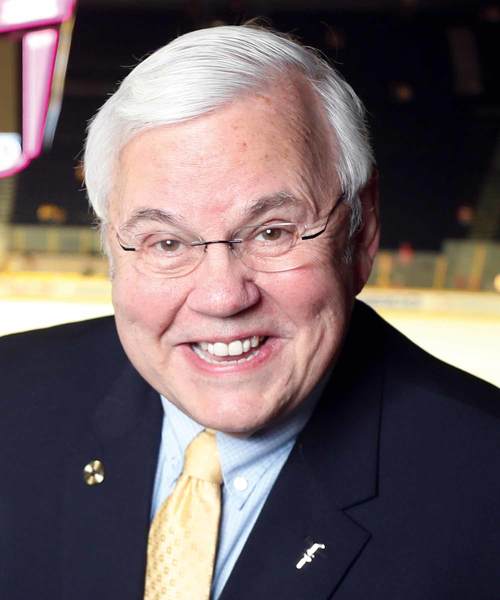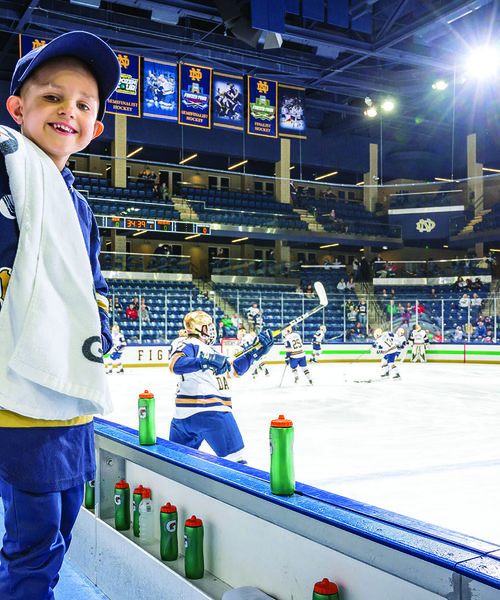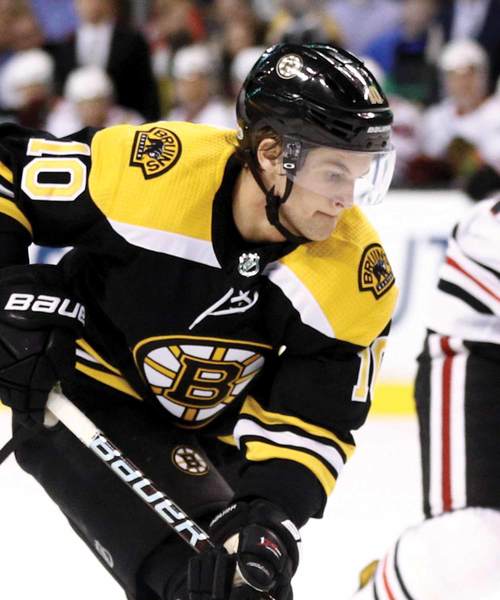
Pete Weber
Live With a Laugh
Athletics have enhanced the University of Notre Dame’s national image since balls were stuffed instead of pumped.
Fighting Irish athletes who became household names during and after their years in South Bend, Indiana, are almost too numerous to count.
Football lists Jerome Bettis, Rocky Bleier, Tim Brown, George Gipp, the Golics (Bob and Mike), Ralph Guglielmi, Terry Hanratty, Raghib “Rocket” Ismail, Bob Kuechenberg, Joe Kuharich, Johnny Lattner, Earl “Curly” Lambeau, Frank Leahy, Alan Page, Ara Parseghian, Joe Theismann and Frank Tripucka to name a few.
On the hardwood, Irish partisans fondly remember Gary Brokaw, Austin Carr, Adrian Dantley, Skylar Diggins, LaPhonso Ellis, Tom Hawkins, Bill Laimbeer, John Paxson, John Shumate, Kelly Tripucka, Orlando Woolridge and College Hall of Fame coach Ray Meyer.
Irish baseball claims two Hall of Famers, Cap Anson and Carl Yastrzemski, and three current major leaguers, John Axford, A.J. Pollock and Jeff Samardzija, in addition to Milwaukee Brewers manager Craig Counsell.
But do you know this name: Pete Weber?
Hockey fans do.
You should, too.
Keep reading and you will.
The jocular Notre Dame graduate, who holds a 1973 bachelor’s degree in modern languages and a 1975 master’s degree in communications, is one of hockey’s most respected, popular and entertaining play-by-play broadcasters. He’s been “The Voice” of the National Hockey League’s Nashville Predators on both radio and television since the franchise joined the NHL as an expansion team for the 1998-99 season, a marriage that has led to the acquisition of five Tennessee Sportscaster of the Year awards and four regional Emmy honors for his trophy den.
Destined to become a “Son of Notre Dame,” the quick-witted product of a quintessential Catholic upbringing was born in St. Mary’s Hospital in Galesburg, Illinois, where he later attended Sisters of Providence Elementary School and Costa Brothers High School before matriculating to—where else?—Notre Dame for a college education.
He fondly remembers nuns at his elementary school rapping left-handed students for using their left hands to write.
“It’s a darn good thing Sandy Koufax didn’t attend my school,” Weber, whose sense of humor is his leading personality trait, says with a chuckle.
During childhood, the baseball-loving St. Louis Cardinals fan and life-long reader nurtured an insatiable appetite and curiosity for sports by reading five newspapers daily--the Chicago Daily News, Chicago American, Galesburg Register-Mail, Peoria Journal Star and St. Louis Post-Dispatch. Little did he realize he was building a foundation for future success.
At Notre Dame, the affable Weber, armed with an encyclopedic sports recall, melodic voice and strong work ethic turned an avocation into a vocation, compliments of the Irish hockey team.
Weber’s path to a broadcasting career in hockey and baseball (15 Triple-A seasons with the Albuquerque Dukes and Buffalo Bisons) that has taken him from the left (NHL Los Angeles Kings) to right (NHL Buffalo Sabres and baseball Bisons) coast plus points in between (Nashville) and afar (Sarajevo, Yugoslavia, with the U.S. hockey team at the 1984 Winter Olympics) began at Notre Dame.
Initially, Weber was an undergraduate student reporter covering Irish hockey games for WSND, the student radio station, and later a play-by-play broadcaster on WNDU Radio during graduate school, years that led to a life-long friendship with Notre Dame hockey coach Lefty Smith who died in 2012.
In a 20-day span as a Notre Dame undergraduate, the sports-obsessed Weber witnessed two defining moments in the annals of Irish athletics—the Ara Parseghian-coached Fighting Irish football team’s win over Bear Bryant’s Alabama Crimson Tide in the last outdoor Sugar Bowl to claim the 1973 national championship and the Notre Dame hoopsters’ upset of UCLA that snapped the Bruins’ 88-game winning streak by scoring the game’s final 12 points.
Notre Dame’s first soccer-style kicker and future Chicago Bear and judge Bob Thomas, who booted the winning points to beat Alabama in that Sugar Bowl, was one of Weber’s college running buddies.
Weber, who is fluent in German, also studied in Austria for one academic year with 47 other students from Notre Dame and Saint Mary’s College. Four decades later, most of the students remain in contact. During his Christmas in Austria, Weber’s parents visited. They drove to Niederwinben, Germany, in the Black Forest to visit his grandfather’s boyhood home. It was there, on the side of a mountain, they found American Forces Radio on a short-wave radio in their Volkswagen, enabling them to listen to Theismann-quarterbacked Notre Dame beat Texas in their second Cotton Bowl meeting.
Weber and his wife, Claudia, were married on the same day as the 1989 USC-ND football game. The wedding was scheduled for the late morning so Pete, Claudia and attendees could watch the annual rivalry tilt in the afternoon. The Irish provided the perfect wedding gift by defeating the Trojans.
The morning of Thursday, Feb. 6, 2014, Weber’s familiar voice almost was silenced.
He credits a fortunate confluence of timing, location and people that day for his good fortune.
The Predators were in Minneapolis-St. Paul for a game that night against the Minnesota Wild, the Preds’ next-to-last contest prior to the NHL’s two-week-long Olympic Games break.
Weber’s morning began at 7 a.m. with a dehydrated, listlessness and cold, clammy feeling. A tingling sensation along his jawline followed.
His dismissiveness turned to concern.
Lucky Contact #1
When Weber joined his broadcast partners at 8:30 a.m. in the hotel coffee shop for a pregame production meeting over breakfast, his cohorts immediately were alarmed by Weber’s appearance.
One member of the group found aspirin for Weber to digest before arranging for transportation and accompanying him to the Wild’s arena, the Xcel Energy Center, to turn him over to experts.
Lucky Contact #2
The Predators’ athletic trainers, joined by their Wild counterparts, took control.
After assessing Weber’s vitals, including blood pressure and respiration rate, they contacted the St. Paul Fire Department EMTs. They arrived immediately. After running EKGs, they calmly whisked Weber to nearby United Hospital.
Lucky Contact #3
The reality of the situation finally hit Weber as he was wheeled into the catheter lab at the hospital.
Within moments, he was introduced to Vanderbilt-educated Dr. Thomas Biggs. Comforted to be in the hands of a “hometown” doctor from Nashville, Weber was prepped for surgery.
In less than an hour, he underwent angioplasty. Three stents were placed in one artery.
Crisis averted—but not quite over.
A happy guy by nature who addresses most things, including negativity, with humor, Weber instead was thankful when he was able to watch the Predators’ 3-2 overtime loss to the Wild that night with his wife, Claudia, who had arrived from Nashville.
“It was a relief just to be able to watch the game despite the outcome,” he says.
Weber enjoyed receiving well wishes from his legion of friends, wise-cracking peers and fans. He was discharged from the hospital the next afternoon and
ordered home for further evaluation after the United Hospital cardiology team transmitted Weber’s information to the Vanderbilt Medical Center where he underwent another procedure the following Thursday.
“I intercepted a heart attack,” Weber says now in reflection.
“My luck was being around the right people at the right time in the right place. I avoided a heart attack due to swift action of many people. Not everybody is as fortunate as I was.”
In the three years since his medical emergency, Weber has made many necessary changes.
His lifestyle now includes regular cardio exercise (elliptical, zero runners, recumbent bikes and other modalities). But no treadmills. He explains, “They hurt my back to the point I walk like Chester on Gunsmoke.”
He drastically altered his eating habits, consuming as many fruits and vegetables “as I can stand,” he says.
He avoids red meat in favor of fish. “This one is easy. I’ve never been one who has to go out for steak. I always have liked fish and seafood. I even enjoyed Catholic school fish lunches on Fridays,” he says.
He also credits his health scare with a better perspective on life.
“I take little for granted now,” he admits. “I’m more sensitive, too,” a claim his many friends might greet with yet another laugh.
Weber’s recommendations for heart health are concise: Stay active, exercise and be aware of fatty substances you take into your body.
“Don’t eat 15 sides of bacon per week,” he says. “Realize you need to be careful. Old habits die hard.”
Notre Dame’s mission statement includes a number of tenets that perfectly capture Weber and his career.
- A willingness to enter into the conversation
- Dedication to the pursuit and sharing of truth
- Respect for the objectives of Notre Dame and a willingness to enter into the conversation that gives it life and character
- The presence and voices of diverse scholars and students
- Pursuit and sharing of truth
Allow Pete Weber to put his life experiences into perspective:
“And now, let’s get back to the games.”

